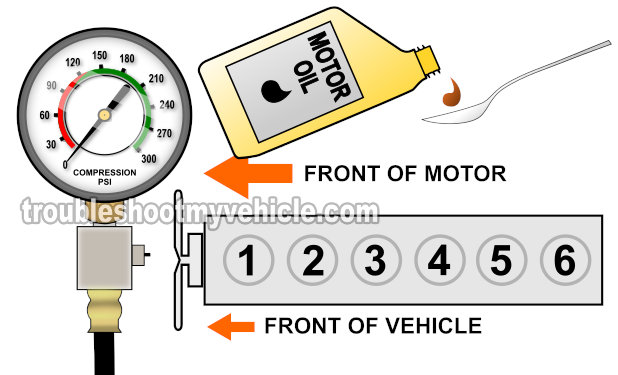Interpreting Your Compression Test Results
On high-mileage engines, it's not unusual to see that some of the 6 compression values you got are lower than the rest.
If the variation between the low value and the highest value is small enough, your Jeep's 4.0L engine will not suffer any type of engine performance problem.
But if the variation is too big, then you're going to see a misfire problem or a rough idle problem.
The cool thing is that we can easily find out if the low compression values are causing an engine performance problem or not.
To find out, we need to figure out if the low compression values are lower than 15% of the highest compression value you got.
You can do this (figuring out the 15%) in one of two ways: You can calculate this 15% difference with pen and paper or you can use my low compression calculator. You can find the low compression calculator here: Online Low Engine Compression Calculator (at: easyautodiagnostics.com).
If you want to manually calculate the 15% difference, here's what you'll need to do:
- STEP 1: Multiply the highest compression value by 0.15 (this is the decimal value of 15%).
- STEP 2: Round the result to the nearest one (for example: 25.6 would become 26).
- STEP 3: Subtract the result (the number that was rounded) from the highest compression value.
- ANSWER: The result of this subtraction is the lowest possible compression value any cylinder can have.
Now, let me give you a more specific example: Let's say that I got the following compression readings:
| Cylinder | Pressure |
|---|---|
| #1 | 165 PSI |
| #2 | 95 PSI |
| #3 | 155 PSI |
| #4 | 175 PSI |
| #5 | 165 PSI |
| #6 | 170 PSI |
My next step is to do the following calculation:
- STEP 1: 175 x 0.15 = 26.25.
- STEP 2: 26.25 = 26 (rounded to nearest one).
- STEP 3: 175 - 26 = 149.
- ANSWER: 149 PSI. Any cylinder with this compression (or lower) value will misfire.
Since cylinder #2 is only producing 95 PSI, I can now conclude that it's 'dead' and causing a misfire.
To find out if the lowest compression value you got from your engine compression test is within a good range, you'll need to do the same calculation. Of course, you'll need to use the highest compression value you got and not the one in the example.
Once you've found the 'dead' cylinder, the next step is to find out what's causing the low compression value. For this step, go to: TEST 2: Wet Engine Compression Test.
TEST 2: Wet Engine Compression Test

Now, if you're wondering if the low compression reading you just obtained is coming from worn out piston rings or from worn out cylinder head valves -there's a test for that too.
The next step, is to add about 2 tablespoons of engine oil to the cylinder that gave you the low compression reading in the previous page. This is known as a ‘Wet’ compression test.
This is what you'll need to do:
- 1
Add about 2 tablespoons of engine oil into the engine cylinder that gave you the low compression reading in TEST 1.
- 2
Install the compression tester onto this cylinder and hand-tighten it once again.
- 3
When ready, have your helper crank the engine.
- 4
Once the needle stops climbing, have your helper stop cranking the engine.
- 5
You'll see one of two results:
1.) The needle will climb to a reading much higher than before.
2.) The compression tester's will read the exact same reading as before.
Let's take a look at what your test results mean:
CASE 1: The compression tester registered a higher reading. This result indicates that the piston rings are the ones that are worn and are the ones causing the low compression reading.
CASE 2: The compression tester DID NOT register a higher reading. This result indicates that the cylinder head valves are the ones that are worn and are the ones causing the low compression reading.
More 4.0L Jeep Diagnostic Tutorials
To see all of the Jeep 4.0L Wrangler, Cherokee, and Grand Cherokee articles, go to: Jeep 4.0L Index Of Articles.
Here's a sample of the test articles you'll find in the index:
- How To Test The MAP Sensor (1997-2003 Jeep 4.0L).
- How To Test The Fuel Pump In 2 Tests (4.0L Jeep).
- Jeep PWM Fan Relay Test Troubleshooting An Overheating Condition.
- How To Troubleshoot A Bad Fuel Injector (Jeep 4.0L).
- How To Test For A Blown Head Gasket (Jeep 4.0L).

If this info saved the day, buy me a beer!

